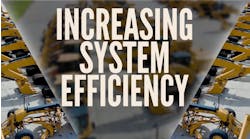Career satisfaction remains high for engineers working in the fluid power industry according to the results of Power & Motion’s 2024 Salary & Career Survey. The majority of respondents, about 80%, indicated as such in the annual survey, which is in line with results from previous years as well.
This was further demonstrated by 94% of respondents indicating they hold the same job they did last year. For those who are not in the same role, it was an even split between those who said they received a promotion with their same employer (50%) and those who left to pursue other opportunities (50%).
Just 11% of respondents indicated they are actively seeking a new position. When asked about their status regarding new employment, 46% of respondents said they cannot envision changing jobs in the foreseeable future, although the same percentage also said that while they are not actively seeking a new role they would follow up if they heard about an interesting opportunity.
Design Work and Salary Among Key Factors to Job Satisfaction for Engineers
The level of satisfaction felt by fluid power engineers can be seen in their tenure. About 20% of respondents said they’ve worked at their current company 15-19 years and 10% have worked at the same company 40 years or more.
Another 34% indicated they have worked at their present company for under a decade which could be due to a combination of people changing jobs and the generational shift taking place in the fluid power industry. Previous years’ survey results had a higher percentage of respondents in the 1-9 year tenure range, as well, indicating the generational shift is a likely factor.
When asked what factors influence job satisfaction, company culture and values was the top response with 56% saying it is very important. Other factors indicated as very important were working in team situations with peers, availability of development tools and the recognition you get from others for the work you do.
Not surprisingly, the actual work of designing products also plays a role in job satisfaction for respondents, as shown in the table below.
Respondents were a bit more divided on how important compensation is to job satisfaction compared to other factors. Just 12% said it is not important at all while 25% view it as important, 33% as very important and 29% as critical.
The majority of survey respondents, 53%, said their salary increased over the past year while 33% said there has been no change. Just 6% said there is a freeze on raises, which is a positive sign that employers are still wanting to invest in their employees especially when it has been a difficult year for the hydraulics and pneumatics sector.
There was an almost even split between respondents who said they feel their company adequately compensates them for the work they do (54%) and those who do not (45%).
Twenty-nine percent see the compensation package at their current employer being equally competitive with others in the industry while 25% see it as being somewhat less competitive. Most respondents, about 81%, believe an increase in pay of over 10% would bring them to a fair compensation level for the work they do.
Use our Salary Comparison Tool to see how your salary compares with other engineers in the U.S.
Engineering Shortage Presents Challenges to Fluid Power Industry
Although job satisfaction is relatively positive, fluid power engineers face challenges in their jobs as well. Among them is the fact 60% said they are being given more tasks outside of their main expertise.
This is not surprising given the many technological changes taking place within the fluid power sector. More software and electronics are being incorporated into fluid power products and systems to improve repeatability, efficiency, and connectivity to other systems. The major industry trends of digitalization, automation and electrification are also driving these and other design changes. As such, engineers need to expand their expertise and capabilities beyond hydraulics and pneumatics.
Added to this is the fact there are many people leaving the industry as they reach retirement age and fewer entering it. Many engineers are thus taking on more work, evidenced by the fact that looming project deadlines and dealing with reductions in staff were noted as being among the top professional issues keeping respondents up at night with 34% and 23%, respectively, indicating as such. This is a shift from our 2023 survey results which showed issues related to product design were of greater concern.
While about half of survey respondents, 56%, said their company plans to increase the number of engineering jobs at their company in the coming year — up from 43% who said as such in our 2023 survey — another 65% said their organization is having difficulty finding qualified candidates for open positions.
The top engineering specialties for which respondents said they are having difficulty finding qualified candidates include:
- mechanical design (53%)
- hydraulics and/or pneumatics (41%)
- systems engineering (41%)
- software (41%)
- robotics (29%).
For those whose companies are hiring, about half of respondents (50%) said they are looking for candidates with an average of 3 years’ experience while 30% said they are looking for those with 5 years of experience.
Given these factors, it is important for fluid power companies to find ways to attract engineers, especially younger generations entering the field. Just 20% of survey respondents said their company has recently added signing bonuses or incentives for new engineering hires while the same percentage said their company has always offered these. Most, 54%, said their company has never offered them.
While this could certainly be a deciding factor for some candidates, as discussed earlier in this piece so too is the design work with which one is involved. A conversation Power & Motion has had several times with those working in fluid power is the need for the industry to better demonstrate all the cool things going on in hydraulics and pneumatics to help attract younger generations.
Fluid power is not necessarily the first sector young engineers think about going into. As such, organizations like the National Fluid Power Association (NFPA) have several programs aimed at introducing young people from middle school and on about this still very vital motion control technology.
In a recent interview with Eric Alström, President of Danfoss Power Solutions, he noted the importance of getting into universities early to show how hydraulics and pneumatics are being used. He also said showing how the industry is aiming to be ‘greener’ can be beneficial as well since sustainability is an especially important topic for younger generations.
READ “Danfoss Optimistic About the Future of Hydraulics” for our full interview with Alström.
Overall, the consensus continues to be that there is an engineering shortage, with 65% of respondents saying as such; in 2023 it was 68% who indicated this and 85% in 2022.
Careers in Engineering can be Enjoyable and Rewarding
Engineering, like any job, has its challenges but the majority of survey respondents believe a career path in engineering is as promising today as it was 5 years ago. And an overwhelming majority, 92%, said they would recommend engineering as a career path to young people.
Reasons given as to why respondents would recommend engineering as a career path include:
“It is exciting and lots of opportunities to be creative and make a difference for efficiency and sustainability in all products.”
“There are many opportunities across a variety of industries.”
“Engineering is still a highly sought after career path and pays better than many other options.”
“It gives you the basis to see things in a different way and approach.”
The value respondents see in engineering careers is evidenced by the fact that just over half of them, 58%, said they do not ever consider leaving the engineering profession. But for the other 41% who consider doing so, top reasons include doing something less stressful, trying something different and making more money.
A slightly higher number of respondents this year also indicated they are ready to retire, 27% compared to 19% who said as such in 2023 while in 2022 it was just 4% who gave this as a reason for leaving engineering — demonstrating again the generational shift taking place. This is not surprising given those who have worked in engineering for 40 years or more tend to make up the majority of respondents to Power & Motion’s annual Salary & Career Survey
With the generational shift taking place in the fluid power and broader engineering markets, it will be increasingly important going forward to showcase how valuable and interesting a career in this sector can be.









